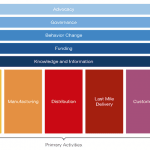Learning to Think Like a Social Entrepreneur: How Nordic Rebels’ ‘Cooking Slam’ Enhances Entrepreneurship Education
Entrepreneurial endeavors are characterized by uncertainty and ambiguity – even more so when they’re taking on some of society’s biggest challenges. So how do social entrepreneurs navigate this uncertainty and bounce back from setbacks as they work to create a successful venture? And how can this journey be truly experienced in an educational environment to prepare them for real-world challenges?
To start off, Saras Sarasvathy’s “effectuation theory” provides a compelling, research-derived answer to the first question. The theory explains how entrepreneurs and changemakers tackle grand challenges, navigating the inherent uncertainty and striving to create meaningful and valuable businesses. Sarasvathy explored how successful entrepreneurs think and work, based on 27 in-depth interviews with high-growth entrepreneurs. Through these conversations, she identified a common process that takes place at the early stages of business development for the majority of entrepreneurs. She linked each step of this process to a metaphorical principle:
- Bird-in-the-hand: Entrepreneurs start with their current assets: who they are, what they know, and whom they know.
- Affordable loss: They limit risk by understanding what they can afford to lose at each stage/ phase of investment.
- Crazy quilt: They form partnerships with stakeholders who share their vision and want to cooperate, rather than compete, to achieve the final outcome, creating a patchwork quilt-like group of diverse allies.
- Lemonade principle: They leverage contingencies, embracing surprises and the unpredictable – ie: they truly embody the adage that “when life gives you lemons, make lemonade.”
- Pilot-in-the-Plane: They determine which factors they can control vs. which ones they can only predict, then focus on the activities within their control – like a pilot who views the future trajectory of their plane (in this case the enterprise) as something that can be influenced by her actions.
In a nutshell, the effectuation process reveals that entrepreneurs are means-driven: They account for and understand their capabilities and resources, and follow a co-creative process. They create new goals from current realities, and shape and construct their future over time. This approach stands in contrast to that of “traditional managers,” who follow a linear path from cause to effect (also known as causal reasoning), and position themselves in a known market through low-risk approaches, where revenue is likely to be higher than the investment, and the business can be viable in the present.
Being conscious of the underlying process of how to navigate unpredictable contexts can help pioneering entrepreneurs who aim to tackle ambiguous challenges. But this still leaves us with the question: How can these future change-makers experience this process in a memorable way through education, before launching new ventures?
An Innovative Approach to Entrepreneur Education
Nordic Rebels follows Saravathy’s principles, enabling students to apply this entrepreneurial concept towards “courageous innovation” in a manner that’s unusual but highly effective, enjoyable and memorable.
Nordic Rebels is a Danish Design Award-winning movement to help learning – whether that’s higher education or continuous learning – evolve from the current norms and constructs that aren’t adapting to a rapidly changing world. The movement was created by an international teaching team spun-off from the IDBM Masters Program at Aalto University in Finland. Our philosophy is based on Nordic values and strengths: openness and trust, storytelling and cuisine, design, entrepreneurship and pedagogical competencies. Building on this, our team is dedicated to boosting what we call universal learning. Similar to the principles in architecture around universal design, which aim to create spaces that are usable by everyone, regardless of their abilities, universal learning espouses the same value, but for learning. We seek to boost this learning in a way that makes it possible for anybody, anywhere to solve “wicked problems” – i.e. complex issues which are not straightforward to solve.
We do this through challenge-based teaching, where teams learn by taking on real-world problems. Applying a blended learning format lets us combine teaching in physical spaces and via digital media, allowing us to provide students with the flexibility to access our learning process from anywhere in the world. In addition, the participants/student teams we work with are multicultural and multidisciplinary, ensuring a rich mix of backgrounds for them to draw from, as they work in small teams to take on real-world challenges. For example, in our 2018 program 12 student teams tackled the UN Sustainable Development Goals (SDGs) within the context of the cities of Helsinki and Copenhagen. Each group was assigned to one SDG, and they were given the freedom to identify an SDG-aligned social problem to address in these cities.
Ultimately, our learning approach leverages challenge-based learning that blends disciplines and technologies (such as virtual reality) to enable students to reclaim ownership of their learning and create memorable learning experiences. This empowers fellow “Rebels” around the world to continue making this world a better place, well after the course is complete.
Teaching Effectuation ‘Tastefully’
Here is an example of how Nordic Rebels teaches Sarasvathy’s effectuation process through a simple but challenging task: cooking.
In her original work, Sarasvathy uses cooking as an analogy to illustrate her theory. This served as the starting point for our colleague, Katharina Schilli, who took it a step further to translate it literally into a cooking process. Thus, the cooking slam was born.
The cooking slam’s goal is to teach the value of thinking entrepreneurially as participants take on distinct challenges – which prepares them for the actual challenges they’ll face in their work. It starts with a brief theoretical session to highlight different strategizing approaches and provide a primer on effectual thinking. Following this, the participants gather in teams around cooking stations in an experimental cooking space, with each station equipped with a visualization of the cooking process on a sheet of paper.
At each station, we also arrange seemingly odd combinations of groceries. These are part of the “means” that the participants have to use as they follow the illustrated cooking process within a predetermined time frame. The goal is to use all the provided ingredients and team skills to create an appetizer, a main course, or a dessert. Next to the pre-set groceries, participants have access to a common “opportunity table” which offers additional culinary choices, such as spices, seasoning or other additional ingredients to refine the cooking creations (but on a first come, first served basis). This allows participants to exercise their effectual thinking to derive value – both from these new opportunities that emerge from the extra ingredients and from their existing means. The value of this approach is reflected in the teams’ final creations, which are inspiring and truly formidable.
Conclusion and Further Reading
For the past two years, our cooking slam has not only been one of the most fun learning experiences Nordic Rebels students have encountered, but it has also helped them learn the vitally useful concept of effectuation in a memorable way. It’s a concept that can inspire them to develop courageous innovations of their own, as they tackle wicked problems to make their world a better place. The Nordic Rebels aim to support the change-makers of tomorrow in any corner of the world: You are welcome to get in touch through any of the channels mentioned below.
You can learn more about effectuation at the Society for Effectual Action, which serves as a great learning resource. From an academic point of view, you can find the roots of effectuation here. You can also find interesting anecdotes from entrepreneurs that reflect the effectual mindset in Inc. Magazine’s article, “How Great Entrepreneurs Think.”
More about Nordic Rebels
If you’d like to learn more about the courses offered by Nordic Rebels, or conduct a similar cooking slam learning experience with your students or employees, feel free to check out our website or find us on Facebook, Twitter, Instagram or get in touch via email.
Adithya Varadarajan is a graduate student at Aalto University and an education designer at Nordic Rebels.
Katharina Schilli is a PhD student at the University of Turku and member of Nordic Rebels.
Photo: A Nordic Rebels Cooking Slam session. Photo credit: Otso Roine.
- Categories
- Education, Social Enterprise



